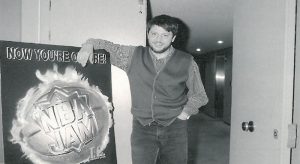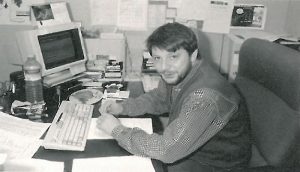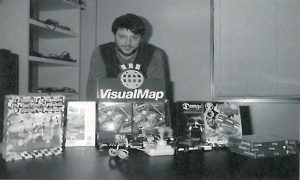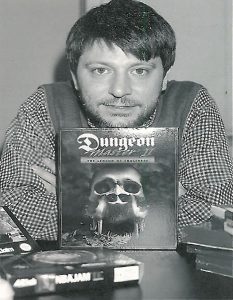The December 1995 issue of Ultima Generación featured this interview with Angel Andrés, Group Product Manager for Spanish distributor Arcadia Software. Though not confined only to talk involving Sega, the interview presents an excellent view of the video game distribution business in one of Europe’s key territories at a time when the 16-bit generation was finally giving way to the newer 32-bit machines.
* * *
Arcadia is the unexpected ace that in the poker game, the software distributor that stealthily places its product on the shelves… a sometimes forgotten name, however, that swims freely in the video game market, a market in which few survive. Ángel Andrés, product manager of the company, analyzes the established format war.
Ultima Generación: In what situation is the market in terms of the new generation formats, and how do you see the arrival of Saturn and PlayStation?
 Ángel Andrés: It really has just begun. It is difficult to make a global assessment of the new platforms. I think we should wait until after Christmas to have a clear idea and, of course, regarding the appearance of the third one in contention, Ultra 64, to have a definitive opinion. Any debut of hardware on the market is always welcomed by software vendors.
Ángel Andrés: It really has just begun. It is difficult to make a global assessment of the new platforms. I think we should wait until after Christmas to have a clear idea and, of course, regarding the appearance of the third one in contention, Ultra 64, to have a definitive opinion. Any debut of hardware on the market is always welcomed by software vendors.
Ultima Generación: Within the objectives of Arcadia, in which formats will you focus your efforts?
Ángel Andrés: Arcadia is going to bet on everything that sells. As software distributors we do not have to opt for any particular platform. After this Christmas season, it is possible that we’ll see something clear on the horizon, but we will never neglect any format in which we can continue to sell units.
Ultima Generación: Do the Jaguar and 3D0 figure into your calculations?
Ángel Andrés: No. We have received some software distribution offers for these platforms, but on the one hand, there is a lack of official distribution that both machines have had until relatively recently (which entails a small base of consoles installed in homes), and on the other, the fact that they want to enter the war after the appearance of the Sega and Sony consoles seems somewhat of a late decision. Official distribution for both machines should have started when they first appeared in the rest of Europe.
Ultima Generación: Given the imminent Christmas season, what goals has Arcadia set for itself, both in the 16-bit and 32-bit markets?
Ángel Andrés: Our primary objective is to grow in the PC CD-ROM market, while maintaining a good catalog of 16-bit home consoles and portables, and to make things even better, watch the evolution of the new platforms (PSX and Saturn ), with few but really ambitious releases. If we achieve all this, we will probably have discovered the magic formula for squaring the circle, that is our intention.
We have some pretty big stuff like Doom on the Super Nintendo; NBA Jam T.E. on PSX and Saturn; Worms on PSX, Mega Drive, Super NES, Game Boy, and Saturn; FIFA ’96 on Game Boy, Street Fighter: The Movie on PlayStation and Saturn, and a few others.
Ultima Generación: How much support is left for 16-bits?
Ángel Andrés: Arcadia will continue betting on 16-bit platforms as long as the producers that we represent in Spain continue to do so. The trend is that much fewer titles will appear next year on 16-bits, but we cannot forget some platforms that are now alive and in force.
Ultima Generación: Does the importation of titles from parallel channels constitute a serious setback for official distributors?
 Ángel Andrés: Yes. I understand that there are times when the user is unable to distinguish between an officially distributed product and a parallel distribution product. What you have to try and do is educate the user so that he buys the official ones, because it entails innumerable advantages, such as instructions in Spanish, telephone technical support, etc… The parallelist is the typical profiteer who takes advantage of the work of others. Official distributors spend money on translations, marketing campaigns, public relations, etc., while the parallelist, taking advantage of said work, dedicates himself to dispatching cartridges over the phone. It is not a fair or serious competition.
Ángel Andrés: Yes. I understand that there are times when the user is unable to distinguish between an officially distributed product and a parallel distribution product. What you have to try and do is educate the user so that he buys the official ones, because it entails innumerable advantages, such as instructions in Spanish, telephone technical support, etc… The parallelist is the typical profiteer who takes advantage of the work of others. Official distributors spend money on translations, marketing campaigns, public relations, etc., while the parallelist, taking advantage of said work, dedicates himself to dispatching cartridges over the phone. It is not a fair or serious competition.
Ultima Generación: To avoid this, shouldn’t the time difference between the release of titles in the U.S. and Japan be reduced in some way compared to our country?
Ángel Andrés: Whenever we can, we try to make the difference as small as possible, but in this we distributors are not to blame, since the launch dates are marked by the original producer. Additionally, it must be considered that production is carried out in the same factories and always following an order of market importance; Europe is always the third after Japan and the U.S., and Spain is a few places behind Germany, England, or France.
Ultima Generación: Taking advantage of the cost reduction of the CD format with respect to cartridges, is it possible that we may see a notable drop in software prices?
Ángel Andrés: I would love to see software at 4,990 pesetas. That would mean an important push for the market since Spanish users could buy games more frequently. The problem is that this question should be answered by the software producers and by the subsidiaries, Sony, Sega, and Nintendo since both those parties are the ones that originate the sale prices for the distributors and, therefore, snowball prices. What I can assure you is that in most products, the margin falls between the two ends of the spectrum: the manufacturer of the CD and cartridges and the man who sells them in the store, leaving both the developer and the distributor in the middle and with minor participation.
Ultima Generación: In issue seven, Mariele Isidoro, CEO of Virgin, told us about the agreement signed with JVC for the distribution of its titles. How then, is it possible that JVC’s Victory Boxing is distributed by Arcadia?
Ángel Andrés: Arcadia Software is the exclusive distributor of JVC Musical Industries for the Spanish territory and, therefore, will be in charge of selling Victory Boxing for Sega Saturn in our country. I think you should ask Miss Isidore the question.
Ultima Generación: The first sales figures seem to indicate that in our country the users have slightly decanted their preferences towards Sony’s machine. Why do you think that is?
 Ángel Andrés: Probably for two reasons: Sony’s excellent domestic image and software releases. The first titles for Saturn did not show everything that this machine was capable of doing. Now that higher quality titles appear on both platforms simultaneously and also at similar hardware price levels, we will have to see the user’s reaction.
Ángel Andrés: Probably for two reasons: Sony’s excellent domestic image and software releases. The first titles for Saturn did not show everything that this machine was capable of doing. Now that higher quality titles appear on both platforms simultaneously and also at similar hardware price levels, we will have to see the user’s reaction.
Ultima Generación: Do you think that the public make Sega pay for its mistakes of the past, such as 32X or Mega CD?
Ángel Andrés: It’s possible. I usually read the typical reader letter sections of specialized magazines. It is a good exercise to really know what the user thinks. In them, I have seen everything, from the user who has bought all the accessories ever made by Sega for his Mega Drive and who now feels a little displaced by the support that Sega is giving to the Saturn to the disappointed users of the Mega Drive who now see the number of products that appear on the market for their console drop significantly. In any case, Sega has a good brand recognition, and I suppose that they will have thought out their campaign to retain their lifelong users.
Ultima Generación: Are there any significant change regarding the distribution of cartridges and CD’s?
Ángel Andrés: If you mean CDs for the new consoles, no. The market and distribution is exactly the same. If the question is regarding the CD-ROM market, then yes, there are certain differences in terms of distribution, production, translation, etc. It is more laborious to work a product on PC CD-ROM than a product on cartridges or CD for PlayStation and Saturn.
Ultima Generación: Is a drastic price reduction possible for 16-bit titles ahead of these dates?
Ángel Andrés: I would say no. It’s possible that there may be a major drop next year.
Ultima Generación: Certain companies make the acquisition of a great title subject to a commitment by the distributor to take on a handful of games of lesser quality. What is Arcadia’s policy in this regard? Do you commit to selling many units of a single program, or do you prefer to sell fewer units of more titles?
Ángel Andrés: Both. Of course what we do not accept, or at least we try not to, is to buy everything that is offered to us. We try to maximize the sales of the great titles without neglecting units of other good products.
Ultima Generación: Define the following machines: Saturn…
Ángel Andrés: A classic Sega leap of quality.
 Ultima Generación: PlayStation:
Ultima Generación: PlayStation:
Ángel Andrés: Sony’s first step into a great market.
Ultima Generación: Jaguar:
Ángel Andrés: A good machine, not enough software, and bad distribution (until recently).
Ultima Generación: Goldstar 3D0:
Ángel Andrés: More or less the same as Jaguar.
Ultima Generación: CD-i:
Ángel Andrés: Good development and the best substitute for home video.

Recent Comments